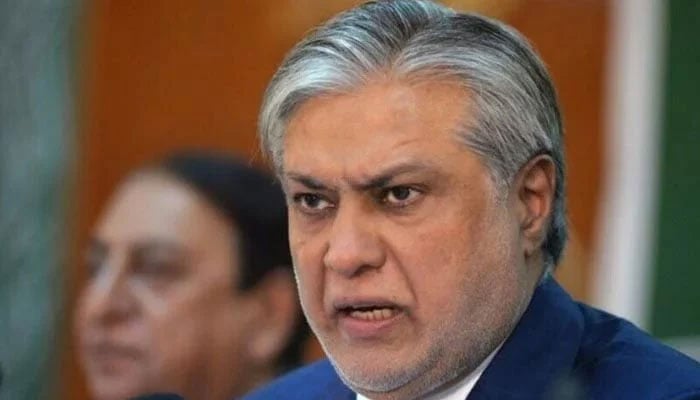Assets beyond means case 'reopened' against Ishaq Dar
Former finance minister to appear before Islamabad's accountability court on October 10
Following the Supreme Court of Pakistan's decision declaring amendments to the National Accountability Bureau's (NAB) laws null and void, the anti-graft watchdog has once again "reopened" the assets beyond means case against former finance minister Ishaq Dar.
According to details, NAB has submitted the record of the assets beyond means case against Dar in the Islamabad accountability court.
Furthermore, Judge Mohammad Bashir has issued a summon directing the ex-finance czar and senior Pakistan Muslim League-Nawaz (PML-N) leader to appear before the court on October 10 next month.
Separately — in Karachi — the accountability court has scheduled the hearing of the NAB reference against Dr Asim and eight others directing the accused to appear before the court on October 7.
The development comes as earlier this month, a three-member bench of the apex in a majority 2-1 verdict approved Pakistan Tehreek-e-Insaf (PTI) Chairman Imran Khan's petition challenging amendments made to the country's accountability laws during the tenure of the previous Pakistan Democratic Movement (PDM)-led government.
The apex court in its September 15 judgment, ordered restoring all graft cases worth less than Rs500 million that were closed against the political leaders and public office holders and declared the amendments void.
Following the SC ruling, the anti-corruption watchdog wrote a letter to the registrar of an accountability court [for the reopening of relevant graft cases].
Also, NAB Chairman Lt-Gen (retd) Nazir Ahmed Butt summoned a consultative meeting to formulate the future course of action. The cases [to be reopned] against prominent politicians including former prime ministers Nawaz Sharif, Yousuf Raza Gillani, Raja Pervez Ashraf, Shehbaz Sharif, Shahid Khaqan Abbasi, former president Asif Ali Zardari, former chief ministers of Sindh, Punjab as well as dozens of former federal and provincial ministers.
NAB amendments
The NAB amendments not only reduced the four-year term of the NAB chairman and the bureau’s prosecutor general to three years but also placed all regulatory bodies functioning in the country out of NAB’s domain.
Furthermore, the changes included that a three-year term be set for the judges of the accountability courts and that courts be bound to decide a case within one year.
Challenging the amendments, PTI supremo Khan approached the apex court and petitioned that the amendments be struck down on the grounds that they were unconstitutional.
The petition argued that amendments to sections 2, 4, 5, 6, 25 and 26 of the NAB law are against the Constitution, along with amendments made to sections 14, 15, 21 and 23.
Furthermore, the PTI chief argued that amendments in the NAB law are contrary to the fundamental rights of Articles 9, 14, 19, 24, and 25.
All these amendments made in the NAB law should be declared null and void, the PTI Chairman had requested.
To hear Khan's plea, a special three-member bench was formed on July 15, 2022. The first hearing of the case against the NAB amendments was held on July 19 last year after Khan's lawyer Khawaja Haris filed an application 184/3 against the NAB amendments.
Both the federation and NAB were made parties in the petition.
-
Security forces gun down 30 terrorists in multiple IBOs in KP: ISPR
-
MQM-P calls for new province in Sindh
-
US report validates Pakistan military edge over India: PM
-
Banned TTP poses serious threat to Pakistan security: UNSC panel
-
CM Afridi clarifies remarks on by-poll after ECP requests army deployment
-
Dubai sees 3.2m Pakistani passengers in 2025 as airport sets new milestone
-
Security forces kill 23 Indian proxy terrorists in KP's Kurram
-
Pakistan to construct island to boost oil exploration: report












